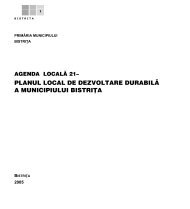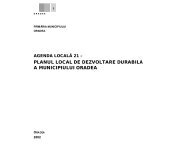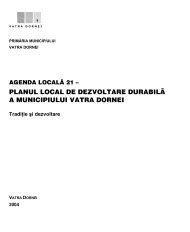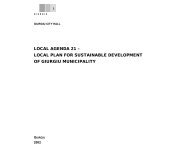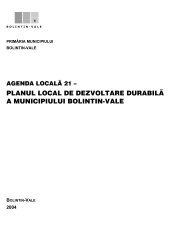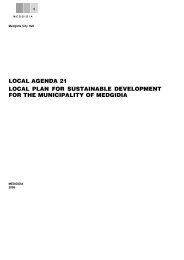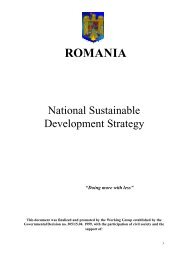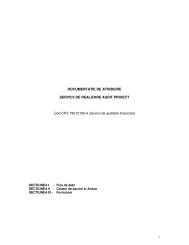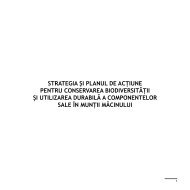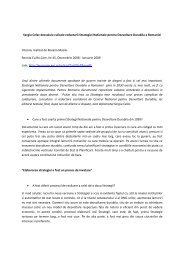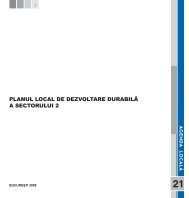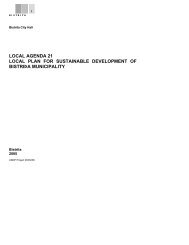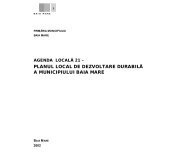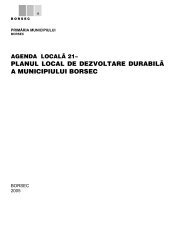Local Plan for Sustainable Development of Sibiu Municipality
Local Plan for Sustainable Development of Sibiu Municipality
Local Plan for Sustainable Development of Sibiu Municipality
You also want an ePaper? Increase the reach of your titles
YUMPU automatically turns print PDFs into web optimized ePapers that Google loves.
37<br />
SIBIU<br />
The pre-school private education level is <strong>for</strong>med <strong>of</strong> 4<br />
kindergartens, the children from these units obtaining<br />
good results in the primary cycle.<br />
There are also 3 post high school teaching units, 2<br />
with sanitary pr<strong>of</strong>ile and 1 with in<strong>for</strong>mation technology<br />
pr<strong>of</strong>ile; 90% <strong>of</strong> the students in these schools are<br />
employed after graduation. The Co-operation school,<br />
a vocational and apprenticeship school, trains<br />
qualified personnel in Public Convenience, beauty<br />
services (hairdressing/barber and manicure).<br />
Graduates from the school frequently find jobs during<br />
internships.<br />
In 1990, in <strong>Sibiu</strong> developed 3 educational alternatives:<br />
Waldorf, Step by Step, and Montessori. The<br />
Montessori alternative has only a pre-school level <strong>of</strong><br />
education.<br />
I.5.1. 5. Extra-curricular activities<br />
The educational curriculum was developed according<br />
to present day educational requirements: development<br />
<strong>of</strong> pupil’s personality, career development, education<br />
<strong>for</strong> a democratic society, high-quality work etc.<br />
Environmental and health education, anti-drug<br />
education, and BTS are particularly emphasised. For<br />
this purpose <strong>of</strong>fices <strong>for</strong> counselling and anti-drug<br />
education were created with the help <strong>of</strong> sponsors and<br />
<strong>of</strong> the “ELID” Foundation (Food Industry School Group<br />
and Machine Construction School Group). Nine school<br />
units participated in the “Vision 2000” programme, and<br />
in all high schools and other school units, anti-drug<br />
education programmes were developed.<br />
Students are also involved in manifestations such as<br />
the Romanian National Day, Earth Day, Christmas<br />
Festivities, Heart Day, Forest Month, Anti AIDS Day,<br />
etc.<br />
Co-operation with institutions and NGOs is very<br />
important <strong>for</strong> extra-curricular activities, <strong>for</strong> the<br />
implementation <strong>of</strong> different programs and projects.<br />
Such institutions and NGOs include: the Red Cross,<br />
Nature School, Crispus, ARAPAMESU, “One child,<br />
one hope” Foundation, “ELID” Foundation, Road<br />
Police Public Health Office, Health Promoting Office,<br />
Environment Protection Inspectorate, “Youths <strong>for</strong><br />
youths” Foundation, “Ascensium” Association, Civilian<br />
Protection Inspectorate, Prevention Service from PJI<br />
<strong>Sibiu</strong> and others.<br />
A Palace <strong>of</strong> children and pupils is active in <strong>Sibiu</strong>.<br />
During the school year 2001-2002, 11,700 pupils<br />
attended the 73 groups <strong>of</strong> studies.<br />
I.5.1.6. Conclusions<br />
• The primary and secondary education in <strong>Sibiu</strong><br />
possesses material and human resources<br />
capable to <strong>of</strong>fer a modern education to the<br />
children in the county. The great number <strong>of</strong> the<br />
teaching staff will be maintained in the following<br />
years. The policy <strong>of</strong> dismissal <strong>of</strong> unqualified<br />
personnel will be continued.<br />
• The education network in <strong>Sibiu</strong> is relatively<br />
stable, and in the following years school units<br />
will be joined <strong>for</strong> the improvement <strong>of</strong> teaching<br />
and a better access to education. The balance<br />
between the theoretical and technological<br />
aspects <strong>of</strong> school plans will be maintained,<br />
according to European standards.<br />
• The teaching situation is good at the primary,<br />
junior high, and high school levels, satisfactory<br />
at the vocational level, and unsatisfactory in<br />
evening classes. Many <strong>of</strong> the schools do not<br />
<strong>of</strong>fer attractive educational alternatives <strong>for</strong> all<br />
children from all backgrounds.<br />
• Capacity and school-leaving-examination<br />
centres were established; according to the two<br />
national examinations which took place, the<br />
conditions <strong>for</strong> obtaining objective education<br />
results were met. The proceedings <strong>of</strong> the<br />
capacity, admission and school-leavingexamination<br />
committees were irreproachable.<br />
• The participation <strong>of</strong> a significant number <strong>of</strong><br />
teaching staff and school units in training<br />
programmes provided by the Special<br />
Committee <strong>of</strong> European Union (Socrates,<br />
PHARE) ensures the access to European<br />
standards in this field, which will influence the<br />
continuous innovation <strong>of</strong> the local, county and<br />
national programmes <strong>for</strong> permanent training.



